人教版九年级全册 Unit 1 How can we become good learners第4课时Section B 1a-1e说课课件(共41张PPT)
文档属性
| 名称 | 人教版九年级全册 Unit 1 How can we become good learners第4课时Section B 1a-1e说课课件(共41张PPT) |
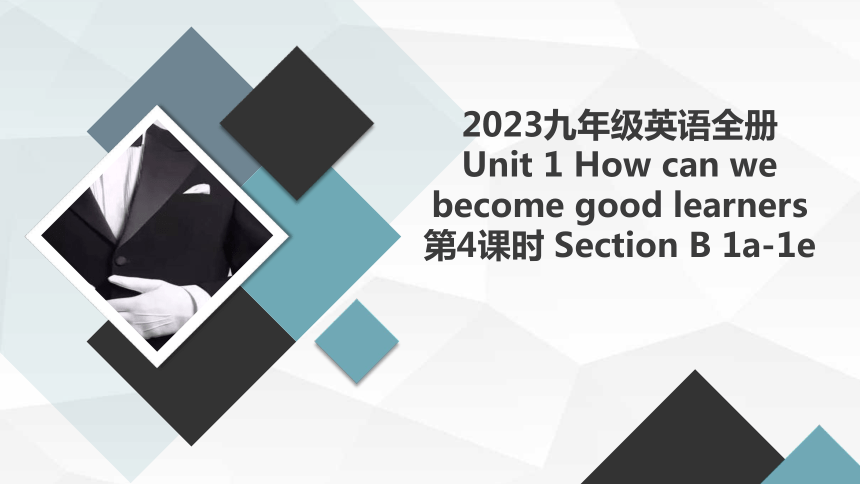
|
|
| 格式 | pptx | ||
| 文件大小 | 2.9MB | ||
| 资源类型 | 教案 | ||
| 版本资源 | 人教新目标(Go for it)版 | ||
| 科目 | 英语 | ||
| 更新时间 | 2023-07-08 08:26:37 | ||
图片预览

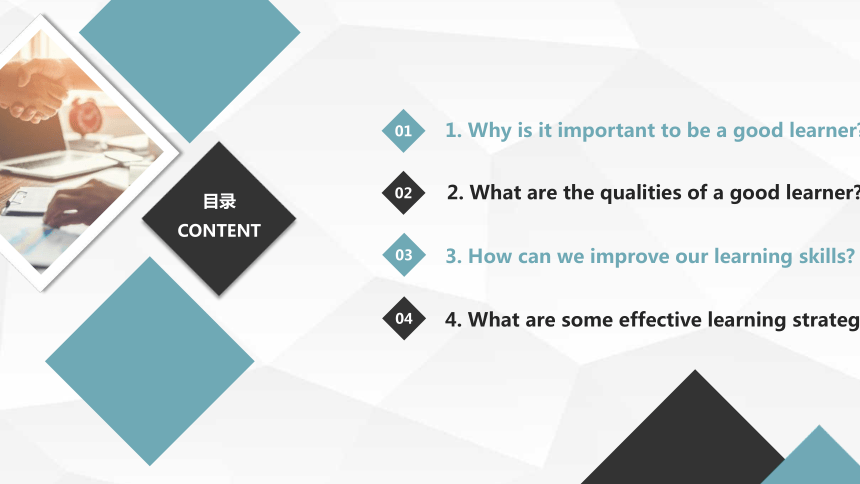
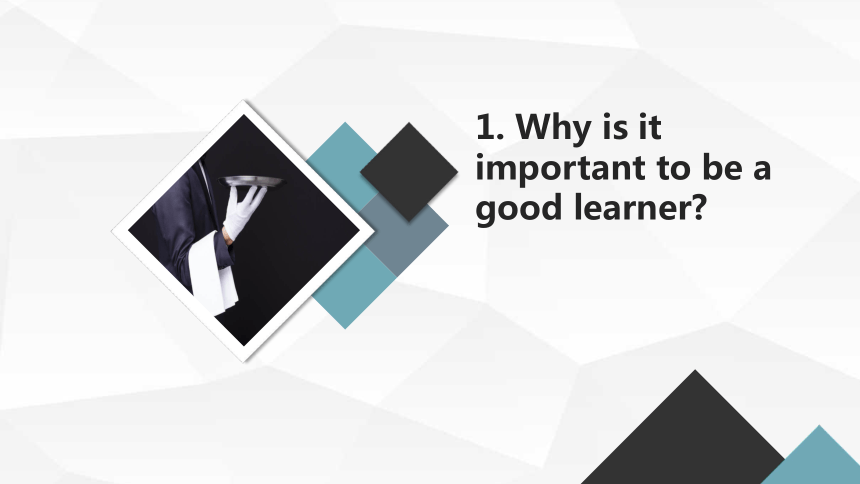
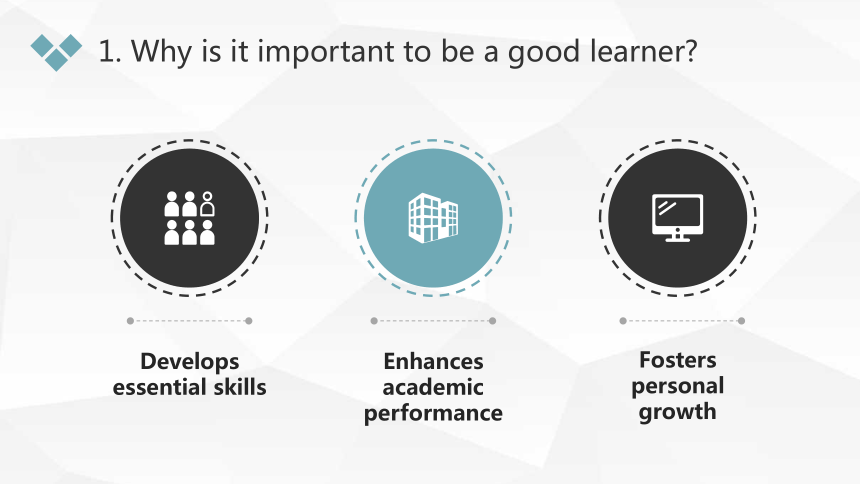
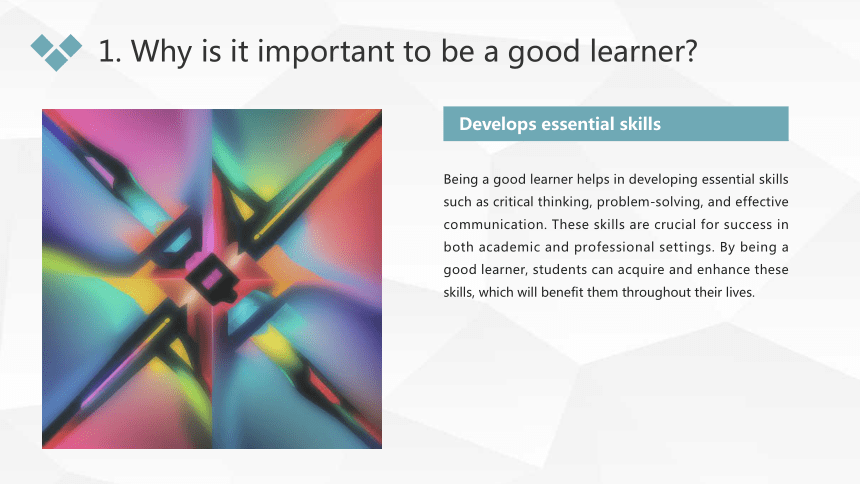
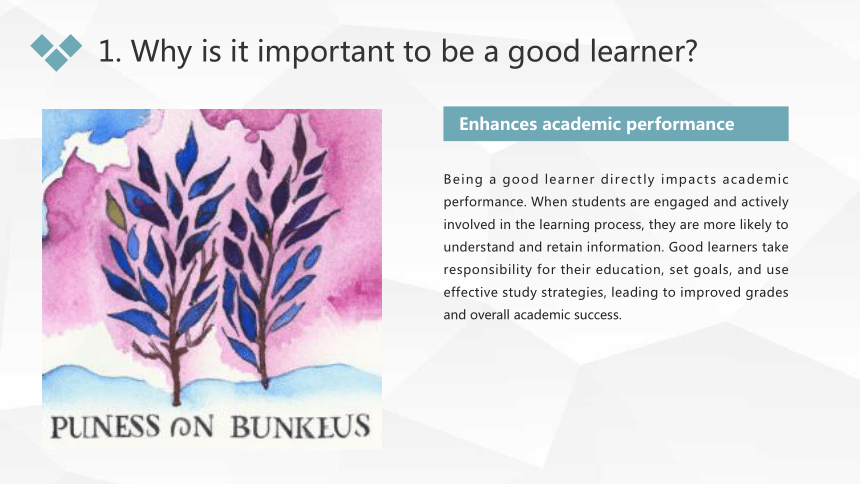
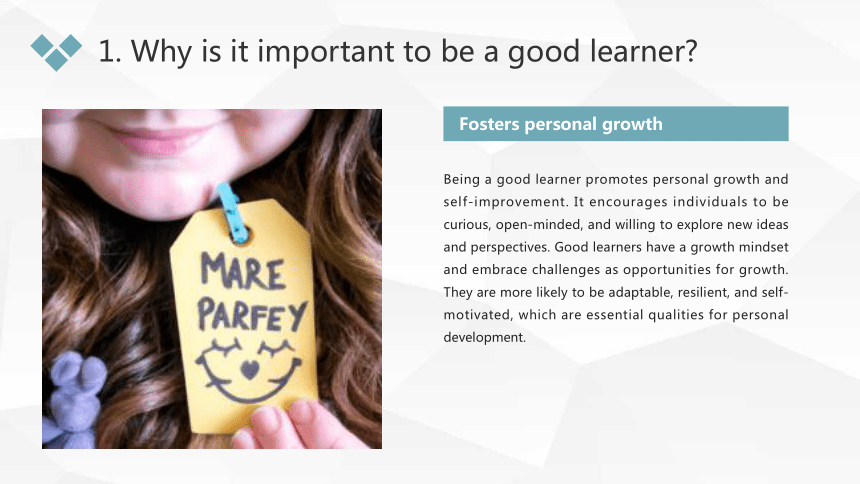
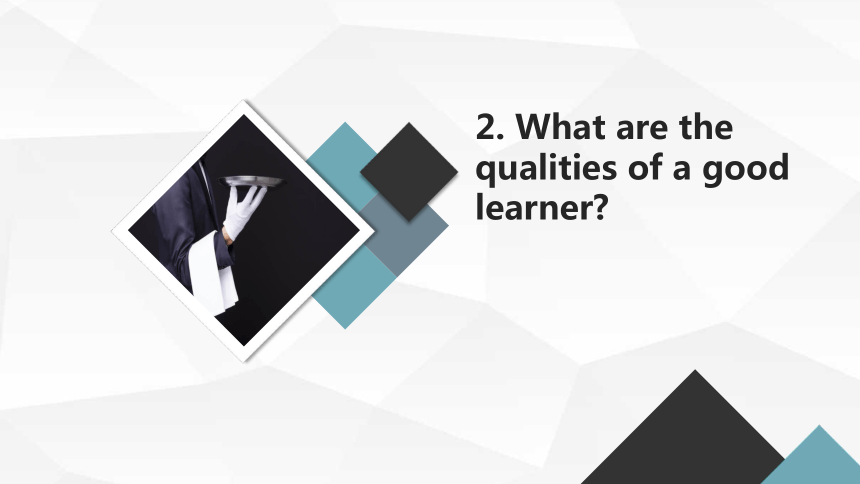
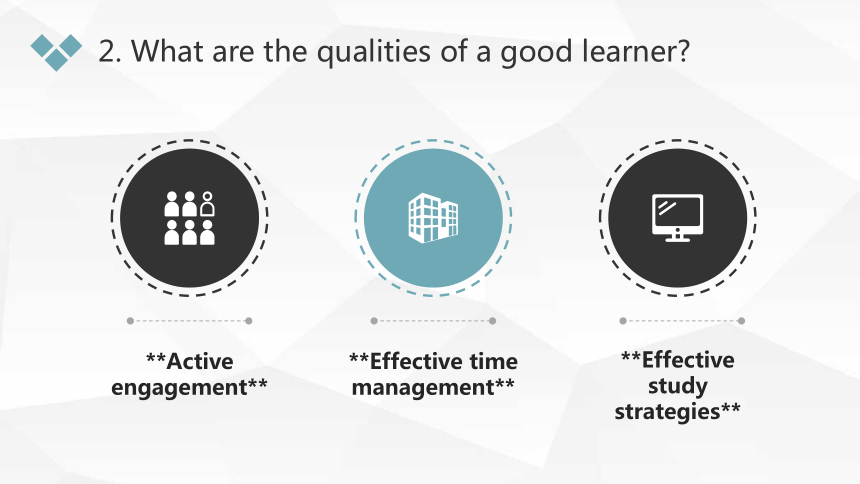
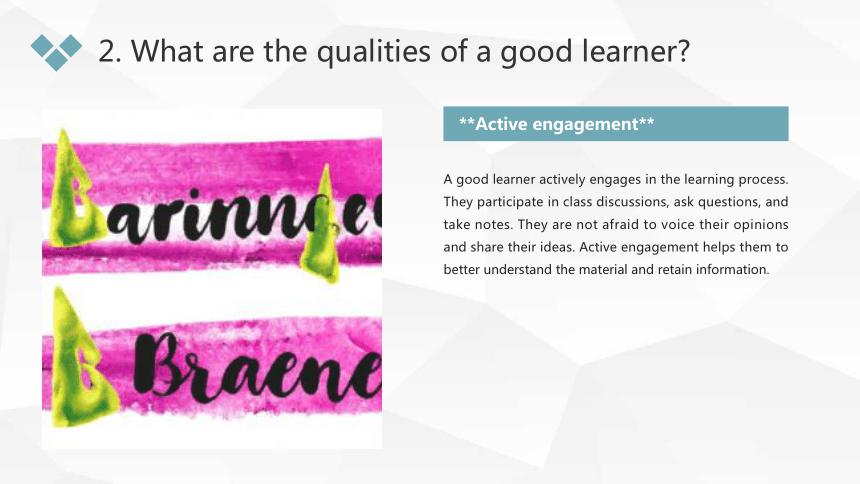

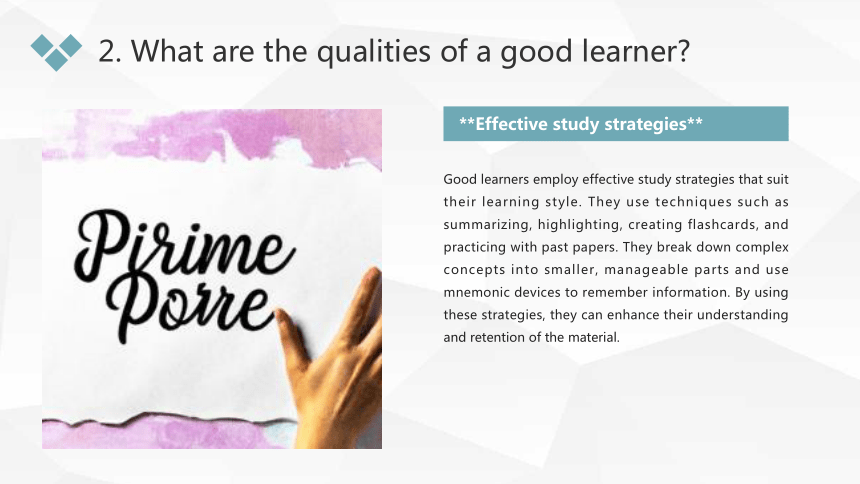
文档简介
(共41张PPT)
2023九年级英语全册
Unit 1 How can we become good learners 第4课时 Section B 1a-1e
目录
CONTENT
1. Why is it important to be a good learner
2. What are the qualities of a good learner
3. How can we improve our learning skills
4. What are some effective learning strategies
01
02
03
04
1. Why is it important to be a good learner
Develops essential skills
Enhances academic performance
Fosters personal growth
1. Why is it important to be a good learner
Being a good learner helps in developing essential skills such as critical thinking, problem-solving, and effective communication. These skills are crucial for success in both academic and professional settings. By being a good learner, students can acquire and enhance these skills, which will benefit them throughout their lives.
Develops essential skills
1. Why is it important to be a good learner
Being a good learner directly impacts academic performance. When students are engaged and actively involved in the learning process, they are more likely to understand and retain information. Good learners take responsibility for their education, set goals, and use effective study strategies, leading to improved grades and overall academic success.
Enhances academic performance
1. Why is it important to be a good learner
Being a good learner promotes personal growth and self-improvement. It encourages individuals to be curious, open-minded, and willing to explore new ideas and perspectives. Good learners have a growth mindset and embrace challenges as opportunities for growth. They are more likely to be adaptable, resilient, and self-motivated, which are essential qualities for personal development.
Fosters personal growth
1. Why is it important to be a good learner
2. What are the qualities of a good learner
**Active engagement**
**Effective time management**
**Effective study strategies**
2. What are the qualities of a good learner
A good learner actively engages in the learning process. They participate in class discussions, ask questions, and take notes. They are not afraid to voice their opinions and share their ideas. Active engagement helps them to better understand the material and retain information.
**Active engagement**
2. What are the qualities of a good learner
Time management is a crucial quality of a good learner. They prioritize their tasks and allocate time effectively for studying, completing assignments, and reviewing material. They create a study schedule and stick to it, avoiding procrastination. By managing their time well, they can stay organized and ensure they have enough time for learning.
**Effective time management**
2. What are the qualities of a good learner
Good learners employ effective study strategies that suit their learning style. They use techniques such as summarizing, highlighting, creating flashcards, and practicing with past papers. They break down complex concepts into smaller, manageable parts and use mnemonic devices to remember information. By using these strategies, they can enhance their understanding and retention of the material.
**Effective study strategies**
2. What are the qualities of a good learner
**Critical thinking skills**
**Perseverance and resilience**
**Effective communication skills**
2. What are the qualities of a good learner
Good learners possess critical thinking skills. They analyze information, evaluate different perspectives, and make connections between concepts. They ask thoughtful questions and seek to understand the underlying principles. By developing critical thinking skills, they can apply their knowledge to real-life situations and solve problems effectively.
**Critical thinking skills**
2. What are the qualities of a good learner
Good learners exhibit perseverance and resilience in the face of challenges. They understand that learning is a process and that mistakes and setbacks are part of the journey. They bounce back from failures, seek help when needed, and learn from their mistakes. Their determination and resilience enable them to overcome obstacles and continue their pursuit of knowledge.
**Perseverance and resilience**
2. What are the qualities of a good learner
Good learners have effective communication skills. They can express their thoughts and ideas clearly and listen actively to others. They engage in meaningful discussions, collaborate with peers, and seek feedback from teachers. Effective communication skills help them to better understand concepts, clarify doubts, and build strong relationships with their peers and teachers.
**Effective communication skills**
2. What are the qualities of a good learner
3. How can we improve our learning skills
**Effective Time Management**
**Active Learning Techniques**
**Effective Study Strategies**
3. How can we improve our learning skills
Good learners know how to manage their time effectively. They prioritize their tasks, set goals, and create a schedule to ensure they make the most of their study time. They avoid procrastination and break their study sessions into smaller, manageable chunks, allowing for regular breaks to maintain focus and prevent burnout. By managing their time well, they are able to accomplish more and retain information better.
**Effective Time Management**
3. How can we improve our learning skills
Good learners engage in active learning techniques that go beyond passive reading and listening. They actively participate in the learning process by taking notes, asking questions, and discussing concepts with peers. They also make use of different learning resources such as videos, online quizzes, and interactive learning platforms to reinforce their understanding. By actively engaging with the material, they enhance their comprehension and retention of the subject matter.
**Active Learning Techniques**
3. How can we improve our learning skills
Good learners employ effective study strategies that suit their individual learning styles. They experiment with different techniques such as creating flashcards, summarizing information in their own words, or teaching concepts to others. They also make use of mnemonic devices, visualization techniques, and mind maps to enhance their memory and understanding. By utilizing these strategies, they are able to make the learning process more enjoyable and effective.
**Effective Study Strategies**
3. How can we improve our learning skills
**Effective Communication**
**Continuous Self-Reflection**
3. How can we improve our learning skills
Good learners understand the importance of effective communication in the learning process. They actively seek clarification from teachers and peers when they encounter difficulties or have questions. They also participate in group discussions and collaborative projects, sharing their ideas and perspectives and learning from others. By engaging in effective communication, they deepen their understanding and broaden their knowledge through different perspectives and experiences.
**Effective Communication**
3. How can we improve our learning skills
Good learners regularly reflect on their learning progress and make adjustments as needed. They evaluate their strengths and weaknesses, identify areas for improvement, and set new goals. They also seek feedback from teachers and peers to gain insights into their learning strategies and areas that need further development. By engaging in continuous self-reflection, they become more self-aware and proactive in their learning journey.
**Continuous Self-Reflection**
3. How can we improve our learning skills
4. What are some effective learning strategies
**Active learning**
**Effective note-taking**
**Time management**
4. What are some effective learning strategies
Active learning involves actively engaging with the material, such as asking questions, participating in discussions, and applying concepts to real-life situations. This approach helps to deepen understanding and retain information more effectively.
**Active learning**
4. What are some effective learning strategies
Taking effective notes during classes or while reading helps to organize information and improve retention. This can be done by using abbreviations, symbols, and highlighting key points. Reviewing and summarizing these notes regularly can enhance understanding and memory.
**Effective note-taking**
4. What are some effective learning strategies
Developing good time management skills is essential for effective learning. This includes creating a study schedule, setting realistic goals, and prioritizing tasks. Breaking down larger tasks into smaller manageable chunks can also help in staying organized and focused.
**Time management**
4. What are some effective learning strategies
**Active participation**
**Effective study techniques**
**Seeking help**
4. What are some effective learning strategies
Actively participating in class discussions, asking questions, and seeking clarification can help in better understanding the subject matter. This also promotes critical thinking skills and encourages a deeper engagement with the material.
**Active participation**
4. What are some effective learning strategies
Utilizing effective study techniques, such as practicing self-testing, using mnemonic devices, and creating mind maps or flashcards, can aid in memory retention and understanding. Experimenting with different techniques and finding what works best for individual learning styles is important.
**Effective study techniques**
4. What are some effective learning strategies
When facing difficulties or confusion, it is important to seek help from teachers, classmates, or online resources. Asking for clarification or additional resources can provide a clearer understanding of the subject and enhance learning.
**Seeking help**
4. What are some effective learning strategies
**Regular review**
**Setting goals**
**Creating a conducive learning environment**
4. What are some effective learning strategies
Regularly reviewing previously learned material helps to reinforce knowledge and prevent forgetting. Creating a review schedule and spending dedicated time each week to revisit past topics can improve long-term retention.
**Regular review**
4. What are some effective learning strategies
Setting clear and achievable goals helps to stay motivated and focused. Breaking down larger goals into smaller milestones allows for a sense of accomplishment and progress. Regularly evaluating and adjusting goals based on progress is important for continuous improvement.
**Setting goals**
4. What are some effective learning strategies
Creating a quiet and comfortable study space, free from distractions, can enhance concentration and productivity. Having all necessary materials and resources readily available can also contribute to an effective learning environment.
**Creating a conducive learning environment**
4. What are some effective learning strategies
**Practice and application**
**Maintaining a positive mindset**
**Balancing study and rest**
4. What are some effective learning strategies
Practice and application of learned concepts and skills are crucial for mastery. Engaging in activities such as solving problems, completing assignments, participating in group projects, or applying knowledge in real-life situations helps to solidify understanding and develop practical skills.
**Practice and application**
4. What are some effective learning strategies
Maintaining a positive attitude towards learning, embracing challenges, and persevering through difficulties is essential for becoming a successful learner. Believing in one's abilities and staying motivated can greatly impact learning outcomes.
**Maintaining a positive mindset**
4. What are some effective learning strategies
Balancing study time with adequate rest and relaxation is important for overall well-being and optimal learning. Taking breaks, getting enough sleep, and engaging in physical activities can improve focus, attention span, and overall cognitive functioning.
**Balancing study and rest**
4. What are some effective learning strategies
2023九年级英语全册
Unit 1 How can we become good learners 第4课时 Section B 1a-1e
目录
CONTENT
1. Why is it important to be a good learner
2. What are the qualities of a good learner
3. How can we improve our learning skills
4. What are some effective learning strategies
01
02
03
04
1. Why is it important to be a good learner
Develops essential skills
Enhances academic performance
Fosters personal growth
1. Why is it important to be a good learner
Being a good learner helps in developing essential skills such as critical thinking, problem-solving, and effective communication. These skills are crucial for success in both academic and professional settings. By being a good learner, students can acquire and enhance these skills, which will benefit them throughout their lives.
Develops essential skills
1. Why is it important to be a good learner
Being a good learner directly impacts academic performance. When students are engaged and actively involved in the learning process, they are more likely to understand and retain information. Good learners take responsibility for their education, set goals, and use effective study strategies, leading to improved grades and overall academic success.
Enhances academic performance
1. Why is it important to be a good learner
Being a good learner promotes personal growth and self-improvement. It encourages individuals to be curious, open-minded, and willing to explore new ideas and perspectives. Good learners have a growth mindset and embrace challenges as opportunities for growth. They are more likely to be adaptable, resilient, and self-motivated, which are essential qualities for personal development.
Fosters personal growth
1. Why is it important to be a good learner
2. What are the qualities of a good learner
**Active engagement**
**Effective time management**
**Effective study strategies**
2. What are the qualities of a good learner
A good learner actively engages in the learning process. They participate in class discussions, ask questions, and take notes. They are not afraid to voice their opinions and share their ideas. Active engagement helps them to better understand the material and retain information.
**Active engagement**
2. What are the qualities of a good learner
Time management is a crucial quality of a good learner. They prioritize their tasks and allocate time effectively for studying, completing assignments, and reviewing material. They create a study schedule and stick to it, avoiding procrastination. By managing their time well, they can stay organized and ensure they have enough time for learning.
**Effective time management**
2. What are the qualities of a good learner
Good learners employ effective study strategies that suit their learning style. They use techniques such as summarizing, highlighting, creating flashcards, and practicing with past papers. They break down complex concepts into smaller, manageable parts and use mnemonic devices to remember information. By using these strategies, they can enhance their understanding and retention of the material.
**Effective study strategies**
2. What are the qualities of a good learner
**Critical thinking skills**
**Perseverance and resilience**
**Effective communication skills**
2. What are the qualities of a good learner
Good learners possess critical thinking skills. They analyze information, evaluate different perspectives, and make connections between concepts. They ask thoughtful questions and seek to understand the underlying principles. By developing critical thinking skills, they can apply their knowledge to real-life situations and solve problems effectively.
**Critical thinking skills**
2. What are the qualities of a good learner
Good learners exhibit perseverance and resilience in the face of challenges. They understand that learning is a process and that mistakes and setbacks are part of the journey. They bounce back from failures, seek help when needed, and learn from their mistakes. Their determination and resilience enable them to overcome obstacles and continue their pursuit of knowledge.
**Perseverance and resilience**
2. What are the qualities of a good learner
Good learners have effective communication skills. They can express their thoughts and ideas clearly and listen actively to others. They engage in meaningful discussions, collaborate with peers, and seek feedback from teachers. Effective communication skills help them to better understand concepts, clarify doubts, and build strong relationships with their peers and teachers.
**Effective communication skills**
2. What are the qualities of a good learner
3. How can we improve our learning skills
**Effective Time Management**
**Active Learning Techniques**
**Effective Study Strategies**
3. How can we improve our learning skills
Good learners know how to manage their time effectively. They prioritize their tasks, set goals, and create a schedule to ensure they make the most of their study time. They avoid procrastination and break their study sessions into smaller, manageable chunks, allowing for regular breaks to maintain focus and prevent burnout. By managing their time well, they are able to accomplish more and retain information better.
**Effective Time Management**
3. How can we improve our learning skills
Good learners engage in active learning techniques that go beyond passive reading and listening. They actively participate in the learning process by taking notes, asking questions, and discussing concepts with peers. They also make use of different learning resources such as videos, online quizzes, and interactive learning platforms to reinforce their understanding. By actively engaging with the material, they enhance their comprehension and retention of the subject matter.
**Active Learning Techniques**
3. How can we improve our learning skills
Good learners employ effective study strategies that suit their individual learning styles. They experiment with different techniques such as creating flashcards, summarizing information in their own words, or teaching concepts to others. They also make use of mnemonic devices, visualization techniques, and mind maps to enhance their memory and understanding. By utilizing these strategies, they are able to make the learning process more enjoyable and effective.
**Effective Study Strategies**
3. How can we improve our learning skills
**Effective Communication**
**Continuous Self-Reflection**
3. How can we improve our learning skills
Good learners understand the importance of effective communication in the learning process. They actively seek clarification from teachers and peers when they encounter difficulties or have questions. They also participate in group discussions and collaborative projects, sharing their ideas and perspectives and learning from others. By engaging in effective communication, they deepen their understanding and broaden their knowledge through different perspectives and experiences.
**Effective Communication**
3. How can we improve our learning skills
Good learners regularly reflect on their learning progress and make adjustments as needed. They evaluate their strengths and weaknesses, identify areas for improvement, and set new goals. They also seek feedback from teachers and peers to gain insights into their learning strategies and areas that need further development. By engaging in continuous self-reflection, they become more self-aware and proactive in their learning journey.
**Continuous Self-Reflection**
3. How can we improve our learning skills
4. What are some effective learning strategies
**Active learning**
**Effective note-taking**
**Time management**
4. What are some effective learning strategies
Active learning involves actively engaging with the material, such as asking questions, participating in discussions, and applying concepts to real-life situations. This approach helps to deepen understanding and retain information more effectively.
**Active learning**
4. What are some effective learning strategies
Taking effective notes during classes or while reading helps to organize information and improve retention. This can be done by using abbreviations, symbols, and highlighting key points. Reviewing and summarizing these notes regularly can enhance understanding and memory.
**Effective note-taking**
4. What are some effective learning strategies
Developing good time management skills is essential for effective learning. This includes creating a study schedule, setting realistic goals, and prioritizing tasks. Breaking down larger tasks into smaller manageable chunks can also help in staying organized and focused.
**Time management**
4. What are some effective learning strategies
**Active participation**
**Effective study techniques**
**Seeking help**
4. What are some effective learning strategies
Actively participating in class discussions, asking questions, and seeking clarification can help in better understanding the subject matter. This also promotes critical thinking skills and encourages a deeper engagement with the material.
**Active participation**
4. What are some effective learning strategies
Utilizing effective study techniques, such as practicing self-testing, using mnemonic devices, and creating mind maps or flashcards, can aid in memory retention and understanding. Experimenting with different techniques and finding what works best for individual learning styles is important.
**Effective study techniques**
4. What are some effective learning strategies
When facing difficulties or confusion, it is important to seek help from teachers, classmates, or online resources. Asking for clarification or additional resources can provide a clearer understanding of the subject and enhance learning.
**Seeking help**
4. What are some effective learning strategies
**Regular review**
**Setting goals**
**Creating a conducive learning environment**
4. What are some effective learning strategies
Regularly reviewing previously learned material helps to reinforce knowledge and prevent forgetting. Creating a review schedule and spending dedicated time each week to revisit past topics can improve long-term retention.
**Regular review**
4. What are some effective learning strategies
Setting clear and achievable goals helps to stay motivated and focused. Breaking down larger goals into smaller milestones allows for a sense of accomplishment and progress. Regularly evaluating and adjusting goals based on progress is important for continuous improvement.
**Setting goals**
4. What are some effective learning strategies
Creating a quiet and comfortable study space, free from distractions, can enhance concentration and productivity. Having all necessary materials and resources readily available can also contribute to an effective learning environment.
**Creating a conducive learning environment**
4. What are some effective learning strategies
**Practice and application**
**Maintaining a positive mindset**
**Balancing study and rest**
4. What are some effective learning strategies
Practice and application of learned concepts and skills are crucial for mastery. Engaging in activities such as solving problems, completing assignments, participating in group projects, or applying knowledge in real-life situations helps to solidify understanding and develop practical skills.
**Practice and application**
4. What are some effective learning strategies
Maintaining a positive attitude towards learning, embracing challenges, and persevering through difficulties is essential for becoming a successful learner. Believing in one's abilities and staying motivated can greatly impact learning outcomes.
**Maintaining a positive mindset**
4. What are some effective learning strategies
Balancing study time with adequate rest and relaxation is important for overall well-being and optimal learning. Taking breaks, getting enough sleep, and engaging in physical activities can improve focus, attention span, and overall cognitive functioning.
**Balancing study and rest**
4. What are some effective learning strategies
同课章节目录
- Unit 1 How can we become good learners.
- Section A
- Section B
- Unit 2 I think that mooncakes are delicious!
- Section A
- Section B
- Unit 3 Could you please tell me where the restroom
- Section A
- Section B
- Unit 4 I used to be afraid of the dark.
- Section A
- Section B
- Unit 5 What are the shirts made of?
- Section A
- Section B
- Review of Units 1-5
- Unit 6 When was it invented?
- Section A
- Section B
- Unit 7 Teenagers should be allowed to choose their
- Section A
- Section B
- Unit 8 It must belong to Carla.
- Section A
- Section B
- Unit 9 I like music that I can dance to.
- Section A
- Section B
- Unit 10 You're supposed to shake hands.
- Section A
- Section B
- Review of Units 6-10
- Unit 11 Sad movies make me cry.
- Section A
- Section B
- Unit 12 Life is full of the unexpected
- Section A
- Section B
- Unit 13 We're trying to save the earth!
- Section A
- Section B
- Unit 14 I remember meeting all of you in Grade 7.
- Section A
- Section B
- Review of Units 11-14
